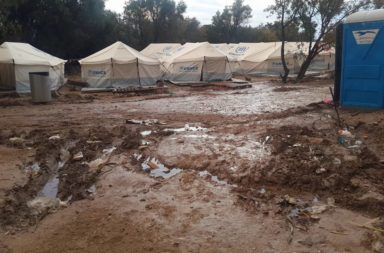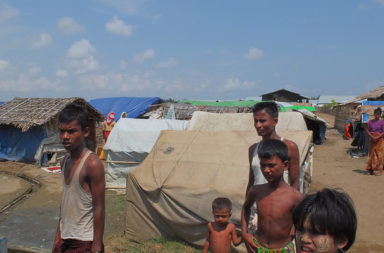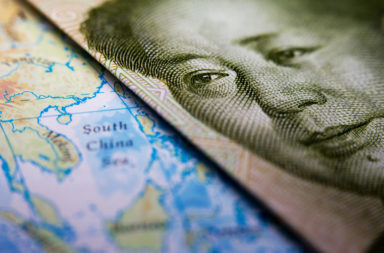Burmese authorities detain four police officers after a video emerges of members of the security forces brutally beating Rohingya Muslims.
- Human rights groups accuse Buddhist-majority Burmese government of religious persecution of minority Muslims in Myanmar.
- Shocking video surfaces backing accusations of abuse against Muslim Rohingyas since counter-insurgency campaign was launched in Rakhine province in October.
- Allegations that the state’s actions amount to ethnic cleansing, and Myanmar’s de facto leader Aung San Suu Kyi, a Nobel peace laureate, faces international criticism.
Shocking Evidence of Persecution: Warning – Graphic Content
Disturbing video footage, reportedly taking place in the Rakhine state on the western coast of Myanmar, shows policemen hitting and kicking young men — all said to be ethnic Rohingyas — as they sit in rows on the ground.
Officers strike the villagers with batons and kick them as they sit at the mercy of their attackers with their hands behind their heads,.
The video clip, originally submitted to Youtube by a Rohingya blogger and later broadcast by numerous media outlets, has shocked the world and cast a spotlight onto the religious persecution and real threat of violence faced by Muslims in Buddhist-majority Myanmar.
In spite of the alarming evidence and growing international pressure, a commission set up by Myanmar’s government says it has so far found no evidence of genocide against Rohingya Muslims in Rakhine state.
In its interim report, the commission also said there was not enough evidence to support widespread rape allegations. It did not mention in its report the claims that security forces had been killing people and burning villages.
Who Are The Rohingya?
The Rohingya are a minority of about 1 million people who traditionally emigrated from India and who, despite having lived in Burma for generations, are treated as illegal immigrants and denied citizenship, and are consequently said to be some of the most oppressed people in the world.
In 1982, Rohingyas’ rights to Burmese citizenship were removed and they were left stateless, despite living in Myanmar for generations.
Many fear an apparent state of apartheid between Rohingya Muslims and their Rakhine Buddhist neighbors and a worsening humanitarian and military crisis in the South East Asian country.
Since communal violence, ethnic riots and police brutality broke out in 2012, more than 120,000 Rohingya have been driven from their homes and crammed into refugee camps guarded by police. Most are denied healthcare and education while their movements are heavily restricted.
How Has Aung San Suu Kyi Responded?
Aung San Suu Kyi has been heavily acclaimed as a leading light for Myanmar following her opposition to the military junta and house arrest totaling 15 years before becoming de facto leader in 2015 in a landslide election victory.
Many of those who had lauded the former political prisoner are now calling on Aung San Suu Kyi to reign in the military who can be seen perpetrating these crimes against a repressed and powerless minority.
But she has stayed silent.
The president Htin Kyaw’s office said in a statement: “The area clearance operation occurred after six violent attackers on three motor bikes shot at 11 policemen on 3 November, in which Police Lance Corporal Min Min Soe died after being shot four times and Police Lance Corporal Myo Zaw Ko was injured.
“The police then conducted the area clearance operation in Kotankauk Village on 5 November, acting on a tip-off that the attackers were being sheltered in Kotankauk Village.
“As soon as the video was found online, the information committee contacted officials of the Myanmar Police Force and the Ministry of Home Affairs.
“An investigation was immediately launched and measures are being taken to take action against those who violated police force rules.”
Amnesty International and other human rights advocates point to the military’s “vicious and disproportionate” security campaign in Rakhine state over the past 2 months, claiming that Burmese security forces have killed, raped and burned down entire villages in a fear campaign.
The rights group accused Nobel peace prize winner Ms Suu Kyi, of “failing to live up to both her political and moral responsibility”
“A human tragedy amounting to ethnic cleansing and crimes against humanity is unfolding in Myanmar,” a group of 11 Nobel peace prize winners, including South Africa’s Archbishop Desmond Tutu and Pakistani activist Malala Yousafzai, wrote in a letter to the UN Security Council.
“If we fail to take action, people may starve to death if they are not killed with bullets,” it added.
It’s clear that fast, decisive action will be required to avoid a slide into yet another black spot in the often sad history of Myanmar.





